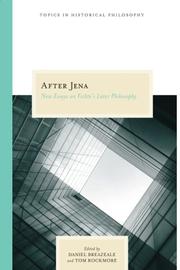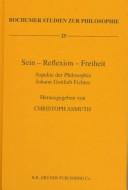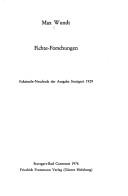| Listing 1 - 10 of 599 | << page >> |
Sort by
|
Book
ISBN: 9783110245295 3110245299 9783110245288 3110245280 1282784196 9781282784192 9786612784194 6612784199 Year: 2010 Publisher: Berlin de Gruyter
Abstract | Keywords | Export | Availability | Bookmark
 Loading...
Loading...Choose an application
- Reference Manager
- EndNote
- RefWorks (Direct export to RefWorks)
This volume is a collection of previously unpublished papers dealing with the neglected "phenomenological" dimension of the philosophy of Johann Gottlieb Fichte, which it compares and contrasts to the phenomenology of his contemporary Georg Wilhelm Friedrich Hegel and to those of Edmund Husserl and his 20th century followers. Issues discussed include a comparison of the early phenomenological method in Fichte and Hegel with the classical phenomenological method in Husserl, Heidegger and Sartre, as well as special topics, namely the problem of self-consciousness and intersubjectivity, very important in Fichte's trancendental philosophy of the Wissenschaftslehre but discussed as well in 20th century phenomenology. Fichte can be said to have invented the theory of intersubjectivity that was first developed by Hegel and then by Husserl, Sartre or Ricœur. Fichte can also be said to have in fact promoted a theory of intentionality based on tendencies, drives, purposes and will, that got a modern shape and language by Husserl and his followers. And even the deduction of the human body in Fichte's practical parts of the Wissenschaftslehre prepares the path for modern twentieth century theories of body, feeling and mind.
Phenomenology --- Fichte, Johann Gottlieb, --- Fichte, Johann Gottlieb
Book
ISBN: 0391038176 Year: 1994 Publisher: New Jersey Humanities press
Abstract | Keywords | Export | Availability | Bookmark
 Loading...
Loading...Choose an application
- Reference Manager
- EndNote
- RefWorks (Direct export to RefWorks)
This collection marks a new era of Anglophone research into the philosophy of J.G. Fichte, both in its historical context and in its relationship to contemporary controversies. Several of the essays demonstrate the relevance of Fichte's thought to current debates over philosophical "foundationalism." Others address such topics as the relationship between morality and law, the role of the imagination, the connection between self-consciousness and intersubjectivity, the status of language, the dialectical character of philosophy, and the relationship between philosophy and mysticism. Still others examine the connections between Fichte's philosophy and that of such thinkers as Leibniz, Schelling, Heidegger, and Tugenhat. This volume also includes the first complete bibliography of English translations of Fichte's writings and of works in English dealing with every aspect of Fichte's thought, which will prove an invaluable research tool for anyone working in this area. The collection will appeal to all scholars, teachers, and students with a general interest in German idealism, as well as specifically in the philosophy of Fichte. It provides both an excellent overview of the current state of research in this field and pointers for future studies.

ISBN: 0810124084 0810124076 9780810124073 9780810124080 Year: 2008 Publisher: Evanston Northwestern university press
Abstract | Keywords | Export | Availability | Bookmark
 Loading...
Loading...Choose an application
- Reference Manager
- EndNote
- RefWorks (Direct export to RefWorks)
The career of J. G. Fichte, a central figure in German idealism and in the history of philosophy, divides into two distinct phases: the first period, in which he occupied the chair of critical philosophy at the University of Jena (1794-1799); and the following period, after he left Jena for Berlin. Due in part to the inaccessibility of the German texts, Fichte scholarship in the English-speaking world has tended to focus on the Jena period, neglecting the development of this major thinker's mature development. The essays collected in this book begin to correct this imbalance. Concerned in a variety of ways with Fichte's post-Jena philosophy, these essays by distinguished and emerging scholars demonstrate the depth and breadth of Fichte scholarship being done in English. With an introduction that locates the essays in philosophical and historical terms, the book divides into three related categories: Fichte's development, his view of religion, and other aspects of his "popular" (or not-so-popular) philosophy. From a wide range of perspectives, the essays show how Fichte's later development reflects the philosophical concerns of his time, the specific debates in which he engaged, and the complex events of his philosophical career.
Book
ISBN: 9783406562303 Year: 2007 Publisher: München : Beck,
Abstract | Keywords | Export | Availability | Bookmark
 Loading...
Loading...Choose an application
- Reference Manager
- EndNote
- RefWorks (Direct export to RefWorks)

ISBN: 9060323491 9786613327833 128332783X 9027276021 9789027276025 9789060323496 Year: 1997 Volume: 25 Publisher: Amsterdam Grüner
Abstract | Keywords | Export | Availability | Bookmark
 Loading...
Loading...Choose an application
- Reference Manager
- EndNote
- RefWorks (Direct export to RefWorks)
Das Denken Johann Gottlieb Fichtes (1762-1814) gehört zu den großen Entwürfen der europäischen Philosophie. Fichtes Wissenschaftslehre entwickelte erstmals eine Theorie des absoluten Ich als Grundlage aller Wissenschaften. Damit schuf er das Fundament für die Entstehung des sog. Deutschen Idealismus. Der politische Denker Fichte nahm Stellung sowohl zur Französischen Revolution als auch zu den Napoleonischen Kriegen. Seine Sprachphilosophie hatte wesentlichen Einfluß auf W. von Humboldt. Seine Religionsphilosophie, namentlich die Anweisung zum seligen Leben (1806), gab wichtige Impulse
Book
Year: 1968 Publisher: Paris: PUF,
Abstract | Keywords | Export | Availability | Bookmark
 Loading...
Loading...Choose an application
- Reference Manager
- EndNote
- RefWorks (Direct export to RefWorks)

ISBN: 3772803024 9783772803024 Year: 1976 Publisher: Stuttgart-Bad Cannstatt : Frommann,
Abstract | Keywords | Export | Availability | Bookmark
 Loading...
Loading...Choose an application
- Reference Manager
- EndNote
- RefWorks (Direct export to RefWorks)
Book
Year: 1918
Abstract | Keywords | Export | Availability | Bookmark
 Loading...
Loading...Choose an application
- Reference Manager
- EndNote
- RefWorks (Direct export to RefWorks)
Fichte, Johann Gottlieb. --- Hochschulschrift. --- Fichte, Johann Gottlieb
Book
ISBN: 9783406630842 Year: 2012 Publisher: München Beck
Abstract | Keywords | Export | Availability | Bookmark
 Loading...
Loading...Choose an application
- Reference Manager
- EndNote
- RefWorks (Direct export to RefWorks)
Philosophers --- Fichte, Johann Gottlieb --- Fichte, Johann Gottlieb,
Book
ISBN: 3772807070 Year: 1978 Publisher: Stuttgart Bad Cannstatt Frommann-Holzboog
Abstract | Keywords | Export | Availability | Bookmark
 Loading...
Loading...Choose an application
- Reference Manager
- EndNote
- RefWorks (Direct export to RefWorks)
| Listing 1 - 10 of 599 | << page >> |
Sort by
|

 Search
Search Feedback
Feedback About UniCat
About UniCat  Help
Help News
News